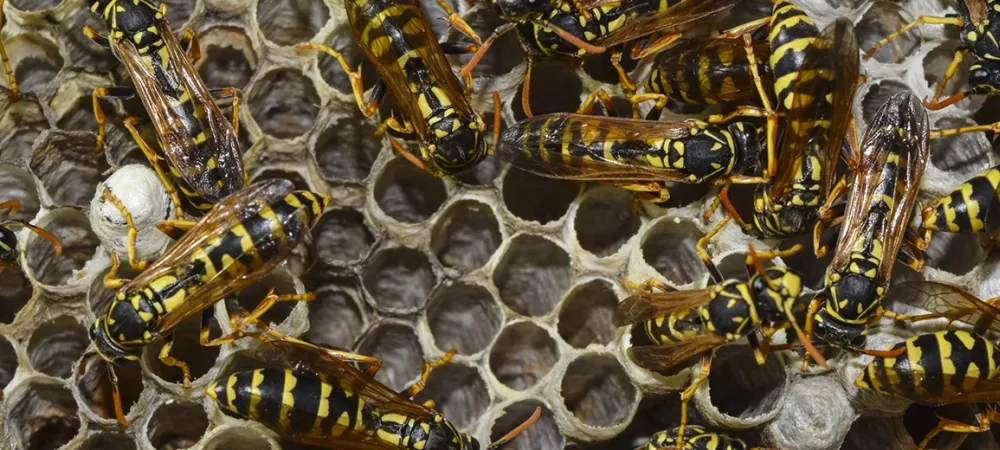Why Stinging Insects Are More Active in Virginia’s Fall Season

As summer transitions into fall in Virginia, you might notice an increase in the presence of stinging insects like wasps, hornets, and yellowjackets. While it’s common to see these pests during the warmer months, their activity tends to spike in the fall, becoming more aggressive and persistent. But why does this happen?
Why Are Stinging Insects More Active in the Fall?
Stinging insects like yellowjackets, wasps, and hornets become more active and aggressive in the fall because their colonies are at their peak, food sources are scarce, and they’re preparing for winter. As a result, you may notice more buzzing around your home, outdoor events, and garbage bins.
Which Stinging Insects Are Common in Fall?
In Virginia and Maryland, several types of stinging insects become more active during the fall as they search for food and defend their nests. The most common species include:
- Yellowjackets – Aggressive ground-nesting wasps that seek sugary foods
- Paper Wasps – Build umbrella-shaped nests on eaves and decks; sting when threatened
- Bald-Faced Hornets – Large, black-and-white wasps that defend aerial nests
- European Hornets – Night-active hornets often found near lights or inside walls
Why Are Stinging Insects Aggressive in Fall?
As fall approaches, stinging insects like yellowjackets and wasps become noticeably more aggressive. This seasonal shift in behavior is driven by changes in their environment and colony dynamics. Here’s why stinging insects are more aggressive in the fall:
Colony Size Peaks
By late summer and early fall, colonies are at their largest, with thousands of workers actively foraging and defending the nest.
Food Sources Decline
Natural food options like nectar and insects decrease, so wasps and hornets turn to human food, especially sweets, meats, and garbage.
Increased Nest Protection
With colder weather approaching and the colony’s life cycle ending, insects become more protective of their nest and remaining queen.
How to Protect Yourself and Your Property from Stinging Insects in Fall
As stinging insects become more aggressive in fall, it’s important to take steps to minimize your exposure and protect your home and family. Here are a few strategies to consider:
Cover Food and Drinks
When eating outdoors, keep food and beverages covered to avoid attracting wasps and hornets. Open containers of sugary drinks are a common target for these insects, so always cover bottles or cans when not in use.
Remove Trash Regularly
Keep garbage cans tightly sealed, and clean up any spills or food scraps around outdoor dining areas. Wasps are drawn to garbage bins and compost piles, so it’s important to remove waste promptly.
Manage Fruit Trees
If you have fruit trees, be sure to pick up fallen fruit regularly. Rotting or overripe fruit is a major attractant for stinging insects in the fall.
Inspect and Remove Nests Early
During the summer, inspect your property for nests and remove them while they are still small. Attempting to remove a large nest in the fall is dangerous, as the insects inside will be highly protective and aggressive. If you find a large nest, contact a professional pest control service for safe removal.
Avoid Wearing Strong Fragrances
Perfumes, lotions, and other scented products can attract stinging insects. Avoid wearing sweet-smelling fragrances when spending time outdoors, especially during fall.
Stay Calm Around Stinging Insects
If you encounter wasps or hornets, remain calm and move slowly away. Swatting at them can provoke an attack, especially in the fall when they are more prone to aggression.
Get Professional Stinging Insect Control Today
Stinging insects in Virginia become more active and aggressive in the fall due to changes in their life cycle, food sources, and colony dynamics. While they play an important role in the ecosystem, their behavior during this season can pose risks to humans, especially when it comes to outdoor activities and food.
By understanding why these insects are more active in fall and taking preventive measures, you can reduce the likelihood of encounters and stings. If you’re dealing with a nest near your home, it’s best to contact Century Termite & Pest Control to handle the situation safely and effectively.
